Dr. Hạnh Nguyễn, Hawaii Pacific University, USA
Dr. Minh Thủy Nguyễn, University of Otago, New Zealand
Dr. Ngọc Nguyễn, Hanoi College of Commerce and Tourism, Vietnam
The International Conference on Language and Social Interaction in Asian Contexts (LASI-AC 2023) took place on December 22nd and 23rd, 2023 in Hanoi, Vietnam. The conference was hosted by the University of Languages and International Studies (ULIS) – Vietnam National University (VNU), Hanoi, Vietnam. It was co-organized by ULIS and the Vietnamese Community for Conversation Analysis (VietCA), a group of international scholars interested in using Conversation Analysis (CA) on Vietnamese data, co-founded by Dr. Hạnh Nguyễn (Hawaii Pacific University, USA), Dr. Minh Thủy Nguyễn (University of Otago, New Zealand), and Dr. Ngọc Nguyễn (Hanoi College of Commerce and Tourism, Vietnam).
The conference aimed to promote conversation analytic research on language use in everyday interaction, workplace communication, and learning and teaching situations in East and Southeast Asia as well as the maintenance of Asian languages and cultures abroad. The conference focus on Asian contexts is a reaction to the majority of research from North America and Europe.
LASI-AC 2023 had a small but rich program including a pre-conference workshop, an interactive invited panel, two keynote presentations, and eleven individual presentations by international scholars. The conference attracted a great number of attendees from different universities across Vietnam and overseas.
The pre-conference workshop on “Analyzing Vietnamese Data for CA Beginners” was facilitated by Dr. Hạnh Nguyễn and Dr. Ngọc Nguyễn. The workshop was attended by nearly 40 participants, including lecturers, graduate students, and early career researchers. It introduced participants to the key principles and basic methodological steps of CA using Vietnamese data samples.
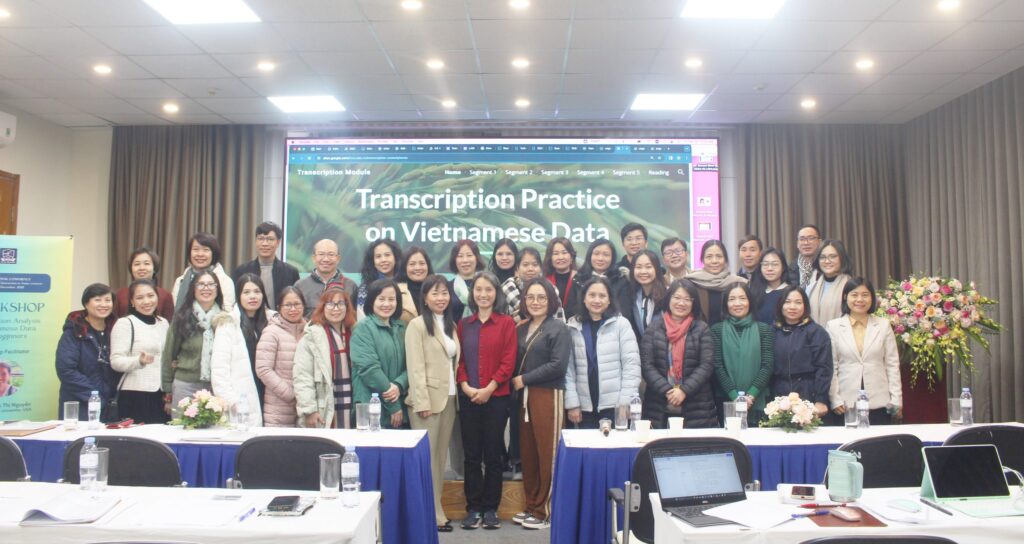
Group photo at the pre-conference workshop on “Analyzing Vietnamese Data for CA Beginners” facilitated by Dr. Hạnh Nguyen and Dr. Ngọc Nguyễn
The conference was officially opened with an inspirational welcome speech by Dr. Đông Quang Lâm, Vice President of ULIS, and by ULIS and VietCA member Dr. Quỳnh Thị Ngọc Nguyễn, Director of the Department of Research, Science and Innovation.
The presentations kicked off with an interactive panel on “Current Issues in Conversation Analysis Research” by four international scholars: Dr. Tim Greer, Kobe University, Japan; Dr. Eric Hauser, University of Electro-Communications, Japan; Dr. Younhee Kim and Huệ thị Xuân Nguyễn, University of Macau, China. Panellists first shared how they got into CA, then presented their current research, and finally provided advice, suggestions, and special considerations for CA beginners. Dr. Tim Greer shared his work on “Placeholders, First Tries and Prospective Indexicals: Lexically Oriented Repair Sequences in Lingua Franca English.” Dr. Eric Hauser gave a talk on “Analyzing L2 data in an ‘exotic’ language: Making Japanese interactional data accessible to a non-Japanese audience.” Finally, Dr. Younhee Kim and Huệ thị Xuân Nguyễn presented their work on “Preliminary reflections on Conversation Analysis and cultural knowledge: Working one’s way through transcripts to culture.” The engaging panel presented the audience with a great opportunity to gain insights and seek advice from CA experts.
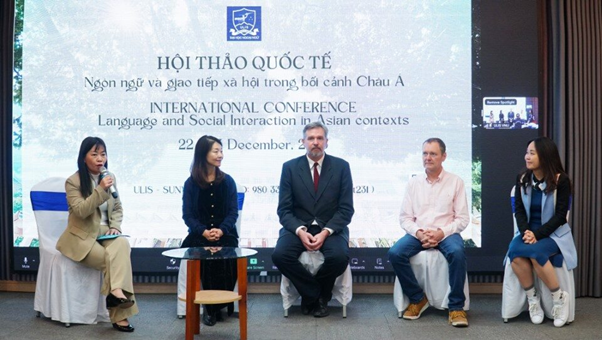
Panel on “Current Issues in Conversation Analysis Research.” From left to right: moderator: Dr. Ngọc Nguyễn; Panelists: Dr. Younhee Kim, University of Macau, China; Dr. Tim Greer, Kobe University, Japan; Dr. Eric Hauser, University of Electro-Communications, Japan; and & Ms. Huệ thị Xuân Nguyễn, University of Macau, China
On the morning of the second conference day, Dr. Hạnh Nguyễn presented a thought-provoking keynote on “Conversation Analytic Explorations into Vietnamese Grammar in Interaction: The Case of Subject Choices.” Following the keynote, there were five individual presentations on different topics:
- “Tag questions in Vietnamese mentoring conversations: an interactional practice by mentors for institutional goal achievements” by Ngọc Nguyễn, Hoa Thị Mai Nguyễn, and Thọ Xuân Phạm;
- “Referential practices in professional meeting in Vietnamese” by Huệ Thị Xuân Nguyễn;
- “Vietnamese Language Development: Building a naturalistic corpus of children’s daily experiences” by Miranda Dickerman and Mai Thị Phương Bùi;
- “Doing as being a victim in storytelling of peer conflict” by Huimin Mia Chen and
- “The Negotiated Boundaries between Interpersonal Relationships and Institutional Agenda” by Hạnh Phạm.
Dr. Minh Thủy Nguyễn, University of Otago, New Zealand, started the afternoon with her keynote on “What does being an elder brother or sister mean in Vietnamese families? A membership categorisation analysis of parent-child conversations.” The conference continued with six presentations delivered in three parallel sessions covering various topics:
- “Gender differences in other-initiated repair strategies: An analysis of Vietnamese casual conversations” (Hương Thị Thanh Vũ & An Thuỳ Trần);
- “Directives in form-filling assistance service encounters” (Thuỷ thị Thanh Phạm);
- “Questions by patients and their companions in doctor-patient-family consultations: A power claim?” (Phương Thị Thảo Trần);
- “How Can Conversation Analysis-Informed Lessons Help to Enhance Thai EFL Learners’ Sequencing Practice?”(Tantiwich Kornsak & Sinwongsuwat Kemtong);
- “Students’ Interactional Competence through Classroom Speaking Activities – A Case Study” (Dung Thị Nguyễn); and
- “Virtual Conversations: Analyzing English Teacher Discourse in Online Meetings” (Khoa Nguyễn Đăng Đỗ).
LASI-AC 2023 also marked the first year of the VietCA Group, which was formed earlier in the year. Until the conference, VietCA members had met monthly on zoom for data sessions. The conference, therefore, provided its members the first chance to get together in person. By the end of the conference, nearly 10 scholars signed up to join the VietCA Group, bringing the total number of members to 43 within the first year of establishment.
Overall, LASI-AC 2023 fueled passion for CA among the scholars who were already doing CA in an academic community where CA itself is not much known and also aroused interest in CA among those who had only heard of or learnt about CA informally without being exposed to what CA actually and truly was. The event also brought together CA scholars from different Asian countries including Japan, Korea, China, Thailand, and Vietnam, and helped build connections with other CA groups in Asia, including CAN-Asia (Japan) and CARDIT (Thailand).
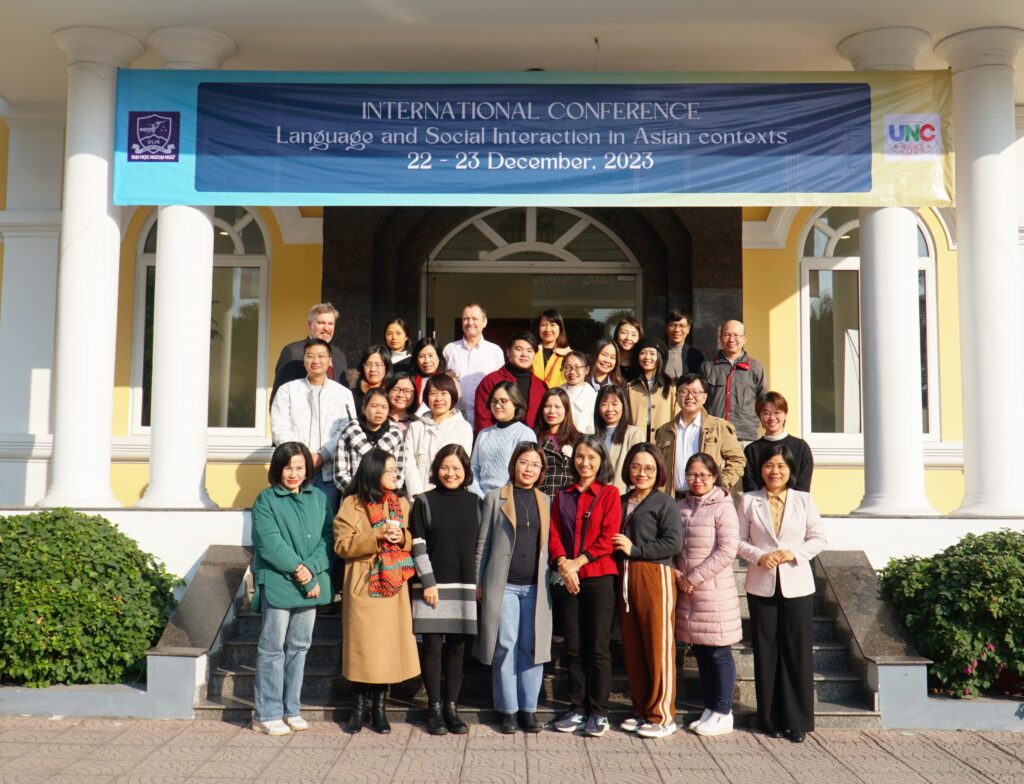
Group photo at the conference
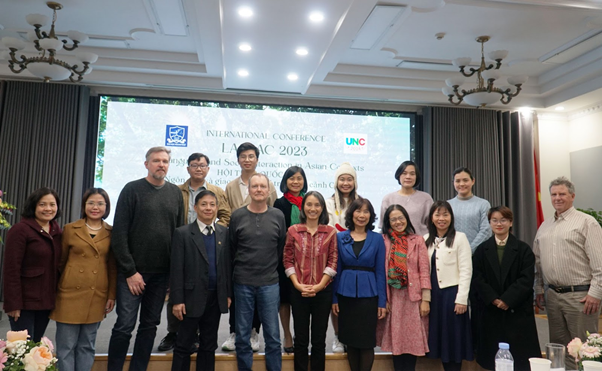
Group photo at the conference closing ceremony
Follow-up Seminar on CA & MCA, in March 30. 2024
Following the success of the LASI-AC 2023 conference, VietCA and ULIS co-organized a seminar to further research on Conversation Analysis (CA) and Membership Categorization Analysis (MCA) in Vietnam. The one-day seminar on March 30, 2024 attracted over 100 participants, most of whom were not familiar with CA beforehand.
The morning session featured four presentations by four renowned international experts from the University of Macau, who are conducting cutting-edge research in Asian contexts. Prof. Richard Fitzgerald started with a talk on “Sacks’ Approach to Ethnomethodological Enquiry and the Principles of MCA.” Then, Assoc. Prof. Todd Sandel presented his research on “New methods for studying humorous, vernacular language videos on China’s social media.” Next, Assoc. Prof. Ricardo Moutinho gave a talk on “Talking about Jupiter and its moons: collaboratively producing images of the night sky.” Finally, Dr. Younhee Kim shared her ongoing study on “I’m going to eat ten vegetables”: Drawing Moral Lessons and Elicited Promises in Shared Book Reading.” All members of the audience were provided with a new perspective on diverse topics.
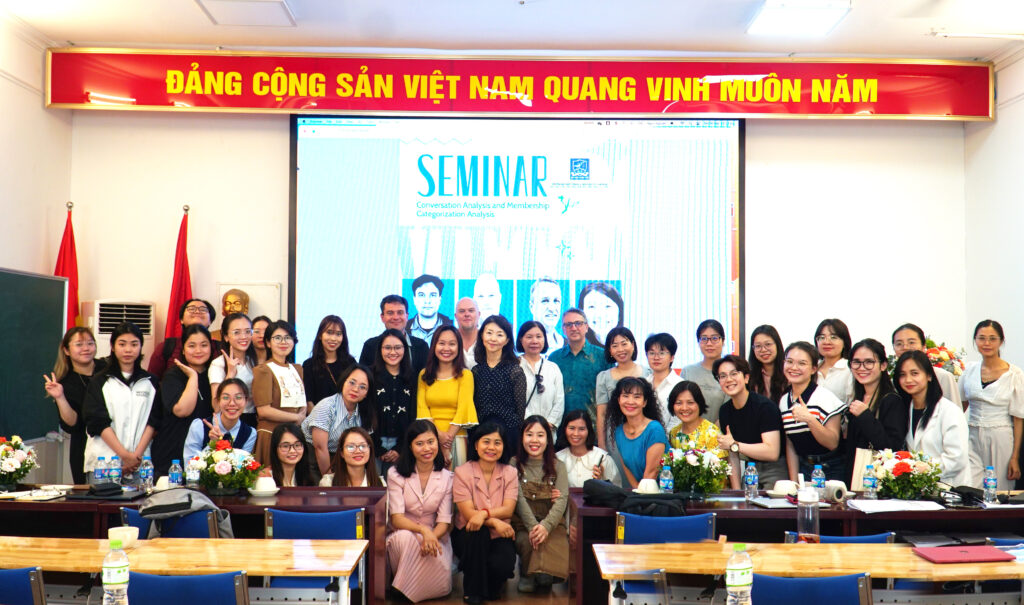
Group photo: the morning session
In the afternoon, there were two brief data sessions exploring “Topic management in Vietnamese family conversations” (shared by Ngọc Nguyễn & Hương Nguyễn using data collected by Hạnh Nguyễn) and “Child language development in a home and family context – building a large corpus of Vietnamese” (shared by Mai Bùi). During these sessions, presenters received feedback and observations from international experts that helped with shaping their research. In addition, these sessions showcased what a CA data session was to the audience. The seminar ended with an open discussion involving all participants.
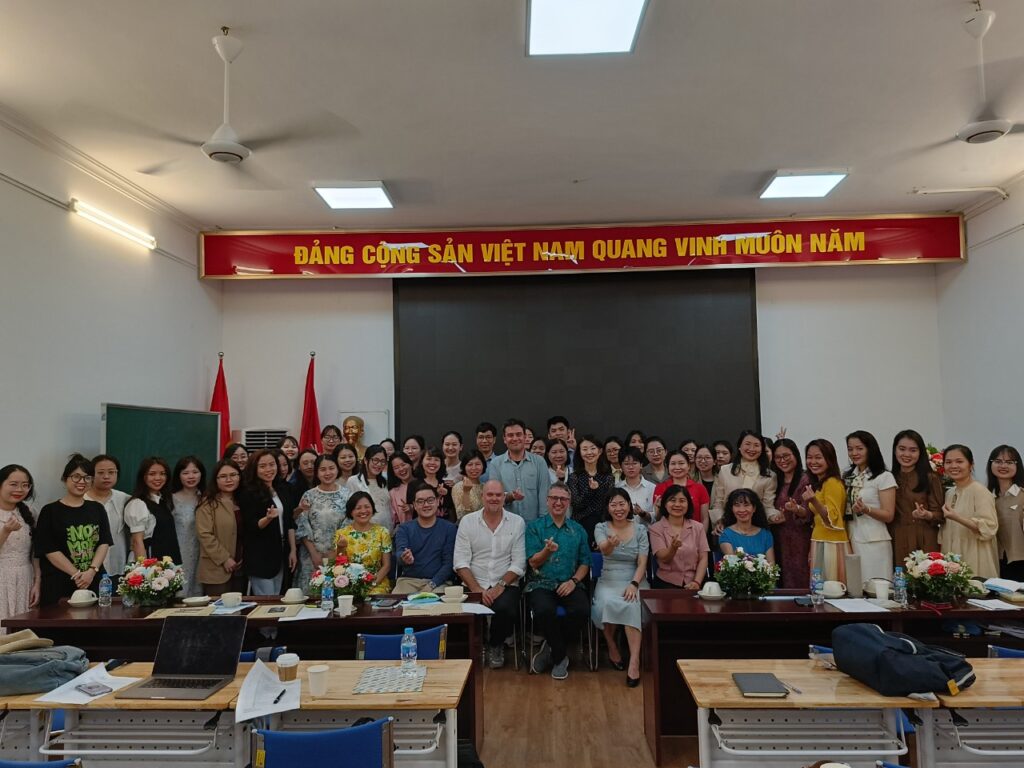
Group photo: the afternoon session
Both events providedare rare opportunities to learn from and interact with international experts in the field and to network with other CA researchers in Vietnam. VietCA plans to hold the next LASI-AC conference in 2025 and more seminars on CA and MCA in the near future.
Testimonials
“This is my thank-you note to the organisers of the Conversation Analysis and Membership Categorization Analysis seminar. The seminar was very helpful both for me and my MA students who attended the seminar with a lot of interest. It provided us with both theories and practical experience. The presenters were inspiring and very enthusiastic, which made the seminar accessible for newbies like my students. It also discussed issues that interested more experienced researchers. The seminar has opened a new direction in research for MA and PhD students at ULIS. We are now thinking of guiding graduate students to study CA and carry out research in this area. Thank you very much for the enjoyable and instructive seminar.”
(Assoc. Prof. Hương thị Mai Nguyễn, Faculty of Postgraduate Studies, ULIS – VNU)
“After attending both the LASI-AC 2023 conference and the seminar on Conversation Analysis, I realized that Conversation Analysis is an approach to studying social interactions, paying attention to verbal and non-verbal communication situations in everyday life. This method of analysis requires a lot of effort and perseverance from recording audio and video to rewriting the dialogue, translating words and meanings into English and then analyzing and finding the difference and formula for the research. I also had difficulties during the research process using this method such as not being able to hear the dialogue clearly, and having a lot of noise during the recording and video recording process. Therefore, in my personal opinion, we should analyze verbal communication situations according to the topics and purposes, which will be more effective than recording all audio and video in daily life without unexpected topics.”
(Tri Huu Tran, Ph.D, Head of Department of Vietnamese and Language, ULIS-VNU)
“Attending LASI-AC 2023 proved to be an exceptionally enriching experience for me, particularly as I navigate the early stages of my career in Conversation Analysis. Discovering the ‘appropriate’ way to present a CA study, especially the seamless integration of audio and visual elements, was like unveiling a new dimension within the field. This method not only enhances the clarity and impact of presentations but also aligns closely with the dynamic and effective communication of research findings.
Learning directly from seasoned professors provided me with new insights and terminology in CA, marking a significant advancement in my professional journey. Such experiences have reinvigorated my passion for the work and expanded my capabilities. Additionally, the opportunity to expand my network and join a broader, vibrant community of CA researchers was incredibly rewarding. Becoming part of a group that shares my academic interests and aspirations has been profoundly motivating.
Overall, LASI-AC 2023 was not merely an academic conference for me; it was a pivotal, eye-opening journey that enriched my understanding and skills. The knowledge, connections, and perspectives I gained will undoubtedly influence my future contributions to the field of Conversation Analysis.”
(Khoa Đỗ Nguyễn Đăng, Lecturer: The National College of Education, Ho Chi Minh city; Founder, People of TESOL/TEFL/Linguistics)
